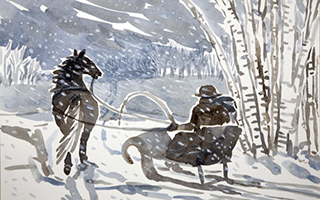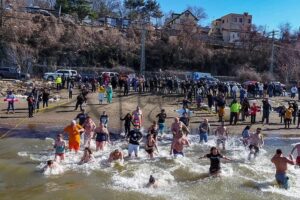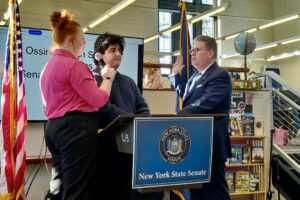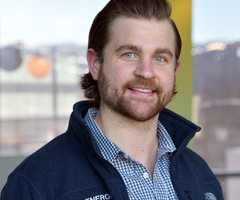 Hudson Chorale, Westchester’s largest mixed chorus, will open its fourth season on Saturday and Sunday, January 25th and 26th at 3:00 pm at the Pleasantville Presbyterian Church with a spirited and inspiring concert of choral works by American composers who looked to poets for their inspiration. The Frost-Thompson connection is only one component of this very special program of poetry brought vividly to life by its natural companion, musicRobert Frost, long considered to be among America’s best poets, was renowned for his use of rural life to depict complex social and philosophical issues.
Hudson Chorale, Westchester’s largest mixed chorus, will open its fourth season on Saturday and Sunday, January 25th and 26th at 3:00 pm at the Pleasantville Presbyterian Church with a spirited and inspiring concert of choral works by American composers who looked to poets for their inspiration. The Frost-Thompson connection is only one component of this very special program of poetry brought vividly to life by its natural companion, musicRobert Frost, long considered to be among America’s best poets, was renowned for his use of rural life to depict complex social and philosophical issues.
Randall Thompson is a composer whose name is synonymous with 20th century American choral music.
Robert Frost’s poetry coupled to Randall Thompson’s musical interpretations: Incomparable!
John F. Kennedy’s passion for the works of Robert Frost impelled the young, newly- elected president to invite the Vermont poet to read one of his works at the 1961 presidential inauguration. Frost was already held in high regard among the educated elite; but his reading on that cold January morning in Washington escalated his fame to rock-star status, and his poetry to the front pages of newspapers across the nation. Less than a month before his assassination, the President chose to read the following at a ceremony dedicating Amherst College’s new library to Frost, lines that every school child in America commits to memory and which resonated personally with Kennedy: “Two roads diverged in a wood and I — I took the one less traveled by. And that has made all the difference.” The composer Randall Thompson set some of Frost’s “country” poetry to music in a collection called Frostiana which includes not only The Road not Taken and Stopping by Woods on a Snowy Evening, but other poems as well which illustrate Frost’s love of rural life and his command of American colloquial speech.
In addition to Frostiana, Thompson’s rousing work, The Last Words of David, will also be performed as well as his signature Alleluia, composed for the opening of the Berkshire Music Center at Candlewood in 1940. It has been performed every year since then as part of the Berkshire Music Festival ceremonies. Thompson, considered by many to be the best American choral composer of the 20th century, spent his entire career developing a style that departed from the great European masters and was uniquely American.
American composer, David L. Brunner, when asked to write a choral work in memory of a former teacher and mentor, chose the words of poet and short story writer Elizabeth Bishop. He said that her poem I am in Need of Music is one of those poems that seems to sing itself off the page. Bishop’s words are intimate and comforting in their own rhythm.
Brunner’s interpretation of the poem converts each line into its musical equivalent, painting melodic images of rest, reflection, and deep calm. Known for his ability to compose music that is compelling and dynamic but which can be performed by singers of all ages, Brunner enjoys wide appeal among listeners of all ages and musical tastes.
Walt Whitman has often been championed as America’s first “poet of democracy,” a title meant to reflect his ability to write in a singularly American manner. It was often said during the 19th century that you could not truly understand the American character unless you read Walt Whitman. He wrote about everyday Americans – the hardworking farmer, the rancher, the housewife, the blacksmith – extolling the virtues of his young country’s rise to independence and self-sufficiency. Much of his poetry identifies with the poor and the marginalized, as well as with the horrors of the Civil War. Many composers have set his verse to music, perhaps none more exuberantly than Pulitzer Prize winner Norman Dello Joio who adapted 10 lines from Whitman’s 200-line poem A Song of Joys (part 7 of the groundbreaking Leaves of Grass) into a joyous choral work – A Jubilant Song. Full of optimism, vitality and, of course, joy, the work is a ringing tribute to the essence of the American spirit.
The word “triptych” is defined as a piece of art in three pieces. Hudson Chorale’s Music Director, Michael Conley, composed Tudor Triptych based on three short poems written around the time of Queen Elizabeth I, circa 16th century. The Queen herself wrote one of the three in which she reflects upon her anguish when the man whom she secretly loves departs and she is bound by duty to hide her grief. It’s a classic case of royal lovesickness and Conley conveys that profound sense of loss through the music. This will be the first public performance of Tudor Triptych and Hudson Chorale is proud to showcase its premiere.
In commemoration of the 50th anniversary of the death of John F. Kennedy, the chorus will dedicate Thompson’s The Road not Taken to our country’s 35th president who once called artists …the unacknowledged legislators of the world. Tribute will also be paid to the late Nelson Mandela. American poet Maya Angelou’s most recent composition, His Day is Done, compares Mandela to the biblical warrior David who had the courage to face seemingly insurmountable obstacles and triumphs against all odds. In her words: We send our souls to you [sons of Africa] as you reflect upon your David armed with a mere stone, facing down the mighty Goliath. Hudson Chorale will continue the celebration of Mandela’s life with a performance of Thompson’s The Last Words of David, an appropriate salute to a man whose courage came from his resolve to seek justice for all men. The piece contains the fitting lines: He that ruleth over men must be just… And he shall be as the light of the morning, when the sun riseth….
Following the concert, the audience is invited to join the performers for an informal reception, a long-standing Hudson Chorale tradition.
Tickets are $25, $10 for students, and can be purchased at the door or in advance by calling (914) 462-3212, or through the website: www.hudsonchorale.org.
The Pleasantville Presbyterian Church is located at 400 Bedford Road, Pleasantville, NY. Handicap parking is available and conveniently located.






